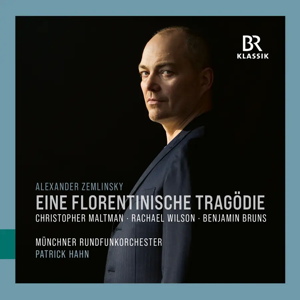
Alexander Zemlinsky (1871-1942)
Eine florentinische Tragödie Op. 16 (1916)
Bianca, wife of the merchant Simone: Rachael Wilson (mezzo-soprano)
Guido Bardi, prince of Florence: Benjamin Bruns (tenor)
Simone, a merchant: Christopher Maltman (baritone)
Münchner Rundfunkorchester/Patrick Hahn
rec. live, 27 November 2022, Prinzregententheater, Munich, Germany
No text or English version included
BR Klassik 900347 [57]
Rather surprisingly, Zemlinsky’s two one-act operas, Der Zwerg and Eine florentinische Tragödie, each based on a work by Oscar Wilde, have turned out to be among the most popular of his works, and there are several recordings of each. This is the earlier work, and Antony Beaumont, in his book on the composer, suggests that the idea for it came from the example of Richard Strauss’s Salome, a one act opera also based on a Wilde play, which had been a huge success.
Wilde’s play is a love triangle. It is set in sixteenth century Florence. Bianca, the wife of Simone, a merchant, has been having an affair with Guido Bardi, a prince. When the play opens Simone has just returned home and found Bianca with Guido. Simone realizes what has been going on, but he pretends not to, and instead bullies, needles and taunts Guido, forcing him to buy his wares, which Guido says he agrees to if he can have Bianca in exchange. Eventually he provokes Guido into fighting a duel with him. He kills Guido. Then, in a sudden reversal of expectations, Bianca praises him, and they are reconciled.
As we have it, the play lacks an opening scene, which would have shown the love affair between Guido and Bianca. The original manuscript was stolen from Wilde’s study shortly after his arrest and the surviving copy lacks the opening scene. It is possible that it was lost but it also possible that Wilde had not written it. The play was premiered in Berlin without it but, at the London premiere, a substitute scene by Thomas Sturge Moore was used. This is not included in Wilde’s works and Zemlinsky did not use it. Instead, the overture, which runs straight into the first scene, represents the love affair.
The influence of Strauss extends to the texture of the work, which is very rich and complex, with numerous interweaving lines. The writing is in Zemlinsky’s late romantic idiom, but without the shocking effects which feature in Strauss’s score. The vocal writing is quite clear – this was, after all, Zemlinsky’s fifth opera. Much the largest part is that for Simone, who carries the work. Bianca and Guido have less to sing.
This is a recording of a single live performance, the premiere of the work at Munich. Simone is Christopher Maltman, a versatile English baritone whose operatic roles have included Jochanaan in Salome. He is also a Lieder singer. He offers a strong and effective interpretation, without having a particularly beautiful voice, and there is a trace of wobble on sustained notes. Bianca is the American Rachael Wilson, who is probably best known for her Mozart roles but who has also sung Wagner and Strauss. She is charming and diffident, as befits the role Guido is Benjamin Bruns, a German tenor who performs widely but has not recorded much. He is suitably ardent.
Patrick Hahn conducts efficiently though he does not always manage to bring out the principal musical lines from the mass of surrounding material. Still, the performance is a good one. The disc also includes a version of the overture with a concert ending.
However, the German text, a translation by Max Meyerfeld, is not included, nor Wilde’s original English. Of the several other recordings, which include a much-praised one by Chailly, I am familiar only with that by James Conlon, recorded over three days in 1997, originally issued by EMI and now available as a download from Warner. This has at least as good a cast – Deborah Voigt is Bianca – and Conlon, a champion of Zemlinsky, does a better job than Hahn in clarifying the musical lines. Moreover, it has a note by Beaumont and the full text in German, English and French. This remains my preferred version.
Stephen Barber
Buying this recording via a link below generates revenue for MWI, which helps the site remain free.



















